GBAGBO MUST GO FORTHWITH

WEEKS after the conclusion of a free and fair election, followed by two visits by high level ECOWAS representatives, and increasing pressure of varying dimensions by the international community, Mr. Laurent Gbagbo, the defeated candidate in the November 28 presidential election in Cote d'Ivoire continues to, in a show of pig-headed intransigence, defy both the popular will of the majority of the Ivorian electorate who, last November gave their mandate to President-elect Allasane Ouattara, and the opinion of the rest of the world.
A second visit a few days ago by a five-person team of African leaders dubbed the Joint African Union-ECOWAS Mission to Cote d'Ivoire failed to persuade Mr. Gbagbo to step down : all they got from him, according to the communiqué issued by the mission in Abuja, was a nebulous commitment to 'negotiate a peaceful end to the crisis without any preconditions', and a promise to lift the blockade by his troops, of the temporary headquarters of the government-in-waiting. On the first point, it must be said directly that this sit-tight president who has ruled since 2000 and postponed elections several times on the pretext that his country was not stable enough to elect its leaders, is merely playing for time.
And, he is doing so even if at a rising cost and further risk to the lives of his fellow citizens (including, of course, his supporters). Already, tens of thousands of Ivoirians have fled to the neighbouring country of Liberia as Gbagbo's marauding supporters, in collusion with sympathizers within the security forces, harass, threaten, and, according to some reports kill members of the opposition. Besides, his refusal to relinquish power directly endangers the very fragile peace and stability of his country just coming out of a civil war. But, it appears from his posture, that this 'leader' cannot be bothered, what seems to matter most to him is that he retains power. Mr. Gbagbo would rather rule in Hell than serve in Heaven. On the second, it needs be noted that 24 hours after Gbagbo made his pledge, he was yet to honour it which indeed indicates that he is not dealing in good faith with the mission, and Africa that they represent.
The Joint African Union-ECOWAS Mission to Cote d'Ivoire suggested in its communiqué that the AU and ECOWAS would 'dispatch another joint high level mission to Cote d'Ivoire as soon as possible to continue the discussions with the two parties'. That the out-going president is acting willfully, deliberately to subvert the popular will of the Ivorian electorate for selfish reasons ( whatever these are) is obvious enough by the way he carries on: he proposed to the mission the common sense-defying idea that a committee be set up to verify electoral materials, he refused to pick calls from the U.S. president Barack Obama ostensibly to discuss the crisis.
So, whereas it would be good indeed that this Gbagbo-engineered crisis were resolved by negotiation, if only for the sake of the lives and property of the Ivorian people, Mr. Gbagbo must be made to understand that the rest of the world can, and will draw a line on how long he can 'negotiate' his defiance of both his own country's rule of electoral law as upheld by the decision of the Independent Electoral Commission, and world opinion.
It is gratifying that the UN, the EU, and several countries have taken specific steps to deny Gbagbo recognition. Canada has terminated the tenure of Gbagbo's envoy and requested the president-elect to name a replacement, the Central Bank of West Africa has reportedly replaced his signature right with Mr. Ouattara's. It is to be noted that Gambia has opted to run against the current of global opinion in this matter. We think that when this matter is over, Nigeria-Gambian relations may need to be re-assessed.
The Gbagbo saga is a familiar and disheartening story of African election and politics. But Africa must begin to do things differently. Firstly, we fully agree with Mr. Ouattara that Gbagbo must, as a first step to negotiate his exit from power, accept the result of the presidential election. The AU member of the mission and Kenyan Prime Minister Oginga Odinga holds the same view. Second, and as Odinga has unequivocally said, 'the Kenyan solution (of power sharing) is not available in the Ivorian [case]. So, if this is what the Gbagbo side is scheming for, it had better forget it.
Third, since Mr. Gbagbo has, by selfish choice, become at this time, 'the problem' in Cote d'Ivoire, may we remind him - if at all he needs to be - of the December 24 resolution of the ECOWAS heads of state to, if need be, employ 'legitimate force', to force him out of power. This has lately been restated by the ECOWAS Commission president, Mr. Victor Gbeho. Now, if Gbagbo forces the military option on the Community, a broad based support must be mustered for the assignment and overwhelming resources be deployed such as will persuade him to change his mind in the shortest time.
In this eyeball-to-eyeball game with one man, ECOWAS must not blink. Nigeria, as a leading member, and the current chair of the Community, must ensure that the will of the people prevails over the will - and rule - of one man in Cote d'Ivoire. Any way the crisis in Cote d'Ivoire is resolved, the bottom line is that Gbagbo must go forthwith. And, lest we forget, he must, in due course, have his day in a court of competent jurisdiction to answer for the troubles he has, since losing the election, taken his people through.
